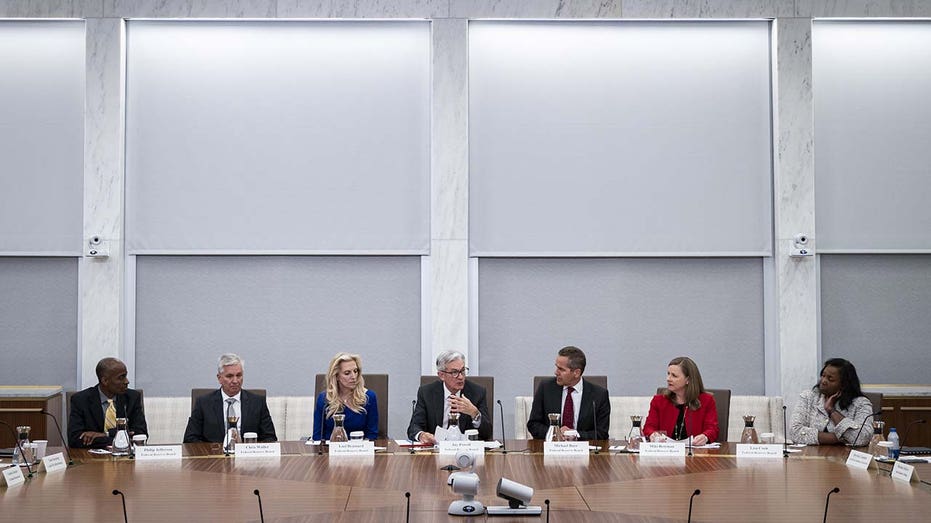Federal Reserve interest rate hike draws mixed reactions: Fed committed to a 'high unemployment recession'
A BlackRock executive described the move as 'a sensible move toward risk management' by the Fed.
Art Laffer on Fed rate hike: Follow the interest rates and the marketplace
Former Reagan economist Art Laffer reacts to Fed Chair Powell's announcement of rate hikes on 'Kudlow.'
Federal Reserve Chairman Jerome Powell announced that the central bank will raise the federal funds rate by 50 basis points Wednesday. His announcement comes off the heels of Tuesday's better than expected consumer price index report, which showed 7.1% inflation in November.
The Fed's interest rate hike was in line with market expectations. While it is lower than the four previous 75 basis point hikes the U.S. central bank enacted earlier this year, it still increases the overall price of borrowing money in the economy. This policy is designed to slow down the economy and bring down prices.
Powell's announcement was met with mixed reactions across the political spectrum on Twitter. Some argued that the Fed risks driving the economy into a recession by continuing to raise rates, while others contended that bringing down inflation should be a top priority.
CITADEL'S KEN GRIFFIN SUES IRS OVER ‘UNLAWFUL' TAX RETURN LEAK

Federal Reserve Chairman Jerome Powell speaks during a news conference at the Federal Reserve Board building in Washington, Wednesday, July 27, 2022. (AP Photo/Manuel Balce Ceneta) (AP Photo/Manuel Balce Ceneta / AP Images)
Jon Stewart, former host of The Daily Show, tweeted "Boy the Fed is really committed to this put us in a high unemployment recession thing."
Shibetoshi Nakamoto, an anonymous account believed to have created Bitcoin, also criticized the central bank.
"[H]ow to stop inflation in 4 easy steps, according to the federal reserve: 1) make everyone unemployed 2) cause a massive recession 3) ??? 4) profit," he wrote.
AFTER NOVEMBER CPI REPORT, EX-TREASURY ECONOMIST WARNS OF MAJOR ‘SHOCK’ TO US ECONOMY

Federal Reserve Chairman Jerome Powell speaks to the Senate Banking, Housing and Urban Affairs Committee, as he presents the Monetary Policy Report to the committee on Capitol Hill, Wednesday, June 22, 2022, in Washington. (AP Photo/Manuel Balce Ceneta / AP Newsroom)
Oklahoma Gov. Kevin Stitt, R, argued that the move would hurt low income Americans most.
"The Fed is raising interest rates AGAIN, and with inflation up 7.1%, families are still paying record-high prices for groceries a week before Christmas. Oklahomans need relief from Biden's inflation and that starts with eliminating the grocery tax," he tweeted.

Philip Jefferson, governor of the US Federal Reserve, from left, Christopher Waller, governor of the US Federal Reserve, Lael Brainard, vice chair of the US Federal Reserve, Jerome Powell, chairman of the US Federal Reserve, Michael Barr, vice chair (Photographer: Al Drago/Bloomberg via Getty Images / Getty Images)
However, not all the reaction to Powell's announcement was negative. Many also praised the Fed for taking action to curb inflation, which erodes real wages and reduces the purchasing power of middle and working class Americans.
Arkansas Rep. French Hill, R, tweeted, "The Fed kept interest rates too low for too long. They're now left playing catch-up in hopes of beating inflation in the short-run without damaging our economy in the long-run. I welcome their efforts to mitigate inflation and urge Chairman Powell to steer clear of policy fads."
Similarly, Tiana Lowe, a commentator for Washington Examiner tweeted "If Jerome Powell holds fast and interest rates average at over 5% next year...he should absolutely be Time's person of the year. Good stuff in his presser right now."
"Markets tumbled on Powell's announcement that the Fed sees interest rates averaging at over 5% through next year -- and over 2% in the long run. Is the era of easy money finally over?" she continued.
Rick Rieder, a chief investment officer BlackRock, also expressed support for the Fed's move.
"In our view, today’s widely anticipated 50 basis point (bps) policy rate hike, a moderation in pace from the recent series of 75 bps hikes, provides a positive signal from the #FOMC that the Committee doesn’t want to overtighten and damage the #economy excessively," Rieder tweeted.
Rieder described the smaller interest rate hike as "a sensible move toward risk management for the #Fed."
"Whether this landing ends up feeling soft or hard is still uncertain, but moderating the pace of rate hikes today, alongside many other forms of #tightening, does appear to be a sensible move toward risk management for the #Fed," he tweeted.
GET FOX BUSINESS ON THE GO BY CLICKING HERE
Over the past year, Powell faced criticism for incorrectly asserting that inflation would be "transitory". Many view the Federal Reserve as partially responsible for the high inflation Americans experienced in 2022. During the COVID-19 pandemic, the Fed purchased $120 billion in securities per month to stimulate the economy and maintained very low interest rates. This, coupled with the federal government's COVID-19 stimulus packages, global supply chain breakdowns, the war in Ukraine, and restrictive energy policies raised prices in the economy.




















